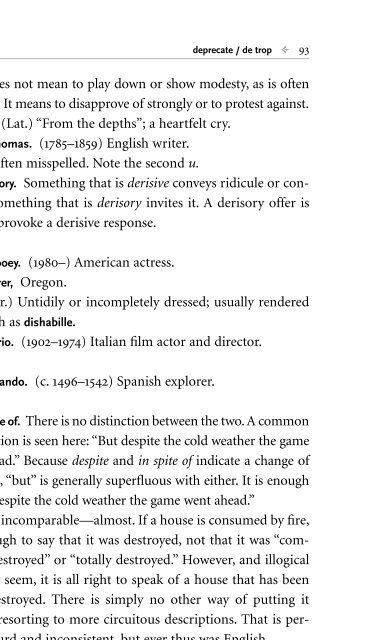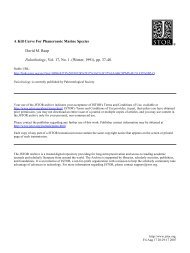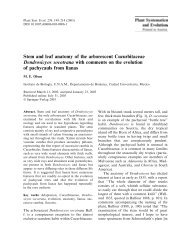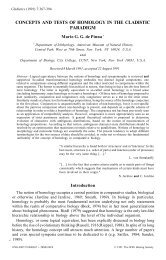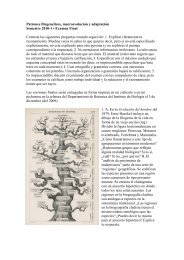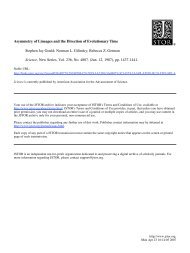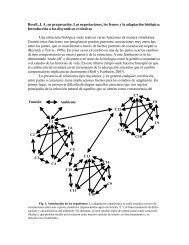- Page 2 and 3:
This book has been optimized for vi
- Page 4 and 5:
also by bill bryson � The Lost Co
- Page 6 and 7:
published by broadway books Copyrig
- Page 9 and 10:
Preface � This book is intended a
- Page 11:
Bryson’s Dictionary for Writers a
- Page 14 and 15:
2 Abidjan / Académie française Ab
- Page 16 and 17:
4 acre / Addams, Jane acre. A unit
- Page 18 and 19:
6 Aeneid / affidavit Aeneid. Epic p
- Page 20 and 21:
8 Aguascalientes / Ala. Aguascalien
- Page 22 and 23:
10 Alfredsson, Daniel / all time Al
- Page 24 and 25:
12 altercation / Améthyste, Côte
- Page 26 and 27:
14 Amtrak / anesthesia, anesthesiol
- Page 28 and 29:
16 Ann-Margret / Antipodean Ann-Mar
- Page 30 and 31:
18 Apfelstrudel / appraise, apprise
- Page 32 and 33:
20 Arc de Triomphe / Arrows of the
- Page 34 and 35:
22 Ashbery, John / assessor too ear
- Page 36 and 37:
24 Attawapiskat / au naturel Attawa
- Page 38 and 39:
26 Avenue of the Americas / Ayers R
- Page 40 and 41:
Bb Baader-Meinhof Gang. German unde
- Page 42 and 43:
30 Balearic Islands / barbaric, bar
- Page 44 and 45:
32 Barroso, José Manuel / Bataan B
- Page 46 and 47:
34 Beaufort / Beethoven, Ludwig van
- Page 48 and 49:
36 Belarussian (or Belarusian) / Be
- Page 50 and 51:
38 Berenson, Bernard (or Bernhard)
- Page 52 and 53:
40 biathlon / blatant, flagrant bia
- Page 54 and 55: 42 Boettcher Concert Hall / bonsoir
- Page 56 and 57: 44 Bosnia and Herzegovina/Bosnia-He
- Page 58 and 59: 46 boyfriend, girlfriend / breach,
- Page 60 and 61: 48 British Guiana / brouhaha dukes
- Page 62 and 63: 50 BST / Bundesrat, Bundestag BST.
- Page 64 and 65: 52 burnt sienna / but burnt sienna.
- Page 66 and 67: Ccc ca. (Lat.) is the abbreviation
- Page 68 and 69: 56 Cameroon/Cameroun / candelabrum
- Page 70 and 71: 58 Canute / carafe Guangzhou. It is
- Page 72 and 73: 60 carillon / Carrasquel, Chico car
- Page 74 and 75: 62 cassowary / CCCP cassowary. Flig
- Page 76 and 77: 64 center around / chafe, chaff cen
- Page 78 and 79: 66 Chancellorsville, battle of / Ch
- Page 80 and 81: 68 Chesapeake Bay / Chincoteague Ch
- Page 82 and 83: 70 Chou En-lai / Cicero, Marcus Tul
- Page 84 and 85: 72 C. Itoh / Clwyd C. Itoh. Japanes
- Page 86 and 87: 74 Cohan, George M. / Colman, Ronal
- Page 88 and 89: 76 committal / compendium committal
- Page 90 and 91: 78 complete and unabridged / Congo
- Page 92 and 93: 80 contemptible, contemptuous / con
- Page 94 and 95: 82 corruptible / country, nation co
- Page 96 and 97: 84 Cratchit, Bob / crocheted, croch
- Page 98 and 99: 86 cupful / cut back cupful, pl. cu
- Page 100 and 101: Dd Dachau. Town near Munich, site o
- Page 102 and 103: 90 Debussy, (Achille-) Claude / de
- Page 106 and 107: 94 Deukmejian, George / diagnosis,
- Page 108 and 109: 96 Dietrich, Marlene / dilettante D
- Page 110 and 111: 98 discernible / dissect, dissectio
- Page 112 and 113: 100 Dodecanese / dormouse Dodecanes
- Page 114 and 115: 102 Double Top Mountain / douse, do
- Page 116 and 117: 104 Duchamp, Marcel / Duns Scotus,
- Page 118 and 119: Ee each. When each precedes the nou
- Page 120 and 121: 108 EEG / Eisenbahn EEG. Electroenc
- Page 122 and 123: 110 elephantiasis / embarrass, emba
- Page 124 and 125: 112 ennoble / EOKA ennoble. ennui.
- Page 126 and 127: 114 E pluribus unum / especially, s
- Page 128 and 129: 116 Euripides / eventuate Euripides
- Page 130 and 131: 118 exorcise / E-ZPass exorcise. ex
- Page 132 and 133: 120 Fahd bin Abdul Aziz / Farrar, S
- Page 134 and 135: 122 FedEx Corporation / Ferraro, Ge
- Page 136 and 137: 124 Fifth Third Bancorp / Fischer,
- Page 138 and 139: 126 flaunt, flout / flounder, found
- Page 140 and 141: 128 forbid, prohibit / former, latt
- Page 142 and 143: 130 Fowler’s / Frankfurter, Felix
- Page 144 and 145: 132 Friedrichshafen / further, fart
- Page 146 and 147: Ggg gabardine, gaberdine. The first
- Page 148 and 149: 136 Gardner, Erle Stanley / GDP, GN
- Page 150 and 151: 138 Geneviève, Sainte / Germany on
- Page 152 and 153: 140 Gettysburg / Gillray, James Get
- Page 154 and 155:
142 GNP, GDP / Good-natur’d Man,
- Page 156 and 157:
144 Gould, Elliott / granddad, gran
- Page 158 and 159:
146 grenadine / gross domestic prod
- Page 160 and 161:
148 Guangdong, Guangzhou / guilleme
- Page 162 and 163:
150 guttural / gypsy guttural. Not
- Page 164 and 165:
152 Haile Selassie / Hammerstein, O
- Page 166 and 167:
154 Harare / Harvard University Har
- Page 168 and 169:
156 Hebrides / heir apparent, heir
- Page 170 and 171:
158 Hepplewhite / Herzog & de Meuro
- Page 172 and 173:
160 Hikmatyar (or Hekmatyar), Gulbu
- Page 174 and 175:
162 Hoffmann, The Tales of / holoca
- Page 176 and 177:
164 Honecker, Erich / horde, hoard
- Page 178 and 179:
166 Hua Guofeng / Hussein, Saddam H
- Page 180 and 181:
168 hypothermia / Hywel hypothermia
- Page 182 and 183:
170 Ictinus / Iguassu (or Iguaçu)
- Page 184 and 185:
172 imply, infer / inadmissible imp
- Page 186 and 187:
174 indefatigable / individual inde
- Page 188 and 189:
176 infinitude / iniquitous infinit
- Page 190 and 191:
178 in situ / international courts
- Page 192 and 193:
180 inveigh, inveigle / Iroquois in
- Page 194 and 195:
182 Issigonis, Sir Alec / Izvestia
- Page 196 and 197:
184 James’s, St. / Jellicoe, John
- Page 198 and 199:
186 jihad / Jordaens, Jakob jihad.
- Page 200 and 201:
Kk Kaaba. Sacred shrine at Mecca. K
- Page 202 and 203:
190 keeshond / Khamenei, Ayatollah
- Page 204 and 205:
192 kimono / Klinefelter syndrome k
- Page 206 and 207:
194 Köln / Krafft-Ebing, Baron, Ri
- Page 208 and 209:
196 Kurile Islands / Kyzyl-Kum the
- Page 210 and 211:
198 laissez-faire / languid, limpid
- Page 212 and 213:
200 LaSorda, Tom / lay, lie LaSorda
- Page 214 and 215:
202 lederhosen / Leinster lederhose
- Page 216 and 217:
204 Lesseps, Ferdinand Marie, Vicom
- Page 218 and 219:
206 lighted, lit / limited mately c
- Page 220 and 221:
208 Llanfairpwllgwyngyllgogerychwyr
- Page 222 and 223:
210 Lyly, John / Lysistrata (“a l
- Page 224 and 225:
212 Macdonald, Ross / MacNeice, (Fr
- Page 226 and 227:
214 Magna Carta (or Charta) / Maki,
- Page 228 and 229:
216 mandamus / March, Fredric manda
- Page 230 and 231:
218 Marsalis, Wynton / masterful, m
- Page 232 and 233:
220 McCarthy, Joseph (Raymond) / Mc
- Page 234 and 235:
222 Medici / Melanchthon, Philipp (
- Page 236 and 237:
224 Menuhin, Yehudi / metathesis th
- Page 238 and 239:
226 Mientkiewicz, Doug / Mindanao M
- Page 240 and 241:
228 Mississauga / modem Mississauga
- Page 242 and 243:
230 moniker / moose moniker (not mo
- Page 244 and 245:
232 most / Muhammad (or Mohammed) m
- Page 246 and 247:
234 Muslim / Myanmar, Burma Muslim
- Page 248 and 249:
Nnn NAACP. National Association for
- Page 250 and 251:
238 NCAA / neither NCAA. National C
- Page 252 and 253:
240 neurasthenia / Niigata neurasth
- Page 254 and 255:
242 nom de guerre / not so much nom
- Page 256 and 257:
Oo o O, oh, oho. The first normally
- Page 258 and 259:
246 odometer / O. Henry odometer. D
- Page 260 and 261:
248 one / on to, onto one can be a
- Page 262 and 263:
250 opus magnum, magnum opus / Orig
- Page 264 and 265:
252 Oudenarde, Battle of / Oxford M
- Page 266 and 267:
p Pp pablum (or pabulum). Food; in
- Page 268 and 269:
256 Pankhurst, Emmeline / par excel
- Page 270 and 271:
258 parturition / paterfamilias and
- Page 272 and 273:
260 pederasty / penniless pederasty
- Page 274 and 275:
262 perceptible / perpetrate, perpe
- Page 276 and 277:
264 Petrovskoye / Philippines, Repu
- Page 278 and 279:
266 pianssimo, pianississimo / Pier
- Page 280 and 281:
268 piranha / plate tectonics piran
- Page 282 and 283:
270 plumage / Pollaiuolo, Antonio d
- Page 284 and 285:
272 porcupine. porcupine / possessi
- Page 286 and 287:
274 pour, pore / precondition, prep
- Page 288 and 289:
276 pretension, but pretentious / p
- Page 290 and 291:
278 Promised Land, the / proper nou
- Page 292 and 293:
280 provenance / Punxsutawney prove
- Page 294 and 295:
Qq q Qaddafi/Gaddafi, Muammar al-.
- Page 296 and 297:
284 Queens College / quincentennial
- Page 298 and 299:
Rr rabbet. Type of groove used in c
- Page 300 and 301:
288 Rastafarianism / reason ...is b
- Page 302 and 303:
290 Regent’s Park / repartee Rege
- Page 304 and 305:
292 Reykjavik / Richter scale Reykj
- Page 306 and 307:
294 Rive Gauche / Rohrabacher, Dana
- Page 308 and 309:
296 Ros-Lehtinen, Ileana / Royal We
- Page 310 and 311:
Sss Saarbrücken, Germany. Saarinen
- Page 312 and 313:
300 sangfroid / Sargent, John Singe
- Page 314 and 315:
302 savoir-faire, savoir-vivre / Sc
- Page 316 and 317:
304 Schollander, Don / Schweitzer,
- Page 318 and 319:
306 SDI / seismograph, seismometer,
- Page 320 and 321:
308 septicemia / ’s Gravenhage se
- Page 322 and 323:
310 Shays’ Rebellion / Shinawatra
- Page 324 and 325:
312 sieve / sine qua non sieve. sig
- Page 326 and 327:
314 skillful. skirmish. skillful /
- Page 328 and 329:
316 Sotheby’s / Spinoza, Baruch d
- Page 330 and 331:
318 Stamford, Stanford / Steffens,
- Page 332 and 333:
320 Storey, David / Streisand, Barb
- Page 334 and 335:
322 Sucre / Surayud Chulanont, Gene
- Page 336 and 337:
324 syllabub (or sillabub) / Szymbo
- Page 338 and 339:
326 Tamaulipas / Tartuffe themselve
- Page 340 and 341:
328 tectonics / terra firma tectoni
- Page 342 and 343:
330 that (as a conjunction) / Thimp
- Page 344 and 345:
332 Thruway / time Thruway is the c
- Page 346 and 347:
334 Togolese / tornadoes This sente
- Page 348 and 349:
336 Toulouse-Lautrec, Henri de / tr
- Page 350 and 351:
338 troglodyte / tsunami troglodyte
- Page 352 and 353:
340 tyrannous. tyrannous / Tyus, Wy
- Page 354 and 355:
342 Ukraine / underdog Ukraine. For
- Page 356 and 357:
344 unison / unpractical/impractica
- Page 358 and 359:
346 Uruguay / Utzon, Jørn Uruguay.
- Page 360 and 361:
Vvv vacillate. vade-mecum. A handbo
- Page 362 and 363:
350 VE Day (or V-E Day) / verbal ag
- Page 364 and 365:
352 via / Virgil via, meaning “by
- Page 366 and 367:
354 vocal cords / von Sternberg, Jo
- Page 368 and 369:
Ww w wacky. Waikiki. Beach and dist
- Page 370 and 371:
358 weather conditions / Westcheste
- Page 372 and 373:
360 whim, whimsy / who, whom and no
- Page 374 and 375:
362 Wimbledon / woolen Wimbledon. T
- Page 376 and 377:
364 wreak havoc / Wynette, Tammy wr
- Page 378 and 379:
Yyy Yablonovy Range, Russia. Yahoo!
- Page 380 and 381:
Zzz Zaandam, Zaanstad, Netherlands.
- Page 382 and 383:
370 Zsigmond, Vilmos / Zworykin, Vl
- Page 384 and 385:
372 Appendix creased. Consider “L
- Page 386 and 387:
374 Appendix A rarer error is seen
- Page 388 and 389:
376 Appendix when they suggest a pa
- Page 390 and 391:
378 Appendix parentheses. Parenthet
- Page 392 and 393:
380 Appendix quently writers fail t
- Page 394 and 395:
382 Appendix Words Ending in -able
- Page 396 and 397:
384 Appendix Abbr. City Airport Nam
- Page 398 and 399:
386 Appendix Metric Prefixes Prefix
- Page 400 and 401:
388 Appendix Country Currency Vietn
- Page 402 and 403:
390 Bibliography and Suggested Read
- Page 405 and 406:
Glossary � Grammatical terms are,
- Page 407 and 408:
Glossary � 395 of the verb. In
- Page 409 and 410:
Glossary � 397 often used when th
- Page 411:
about the author bill bryson’s be


